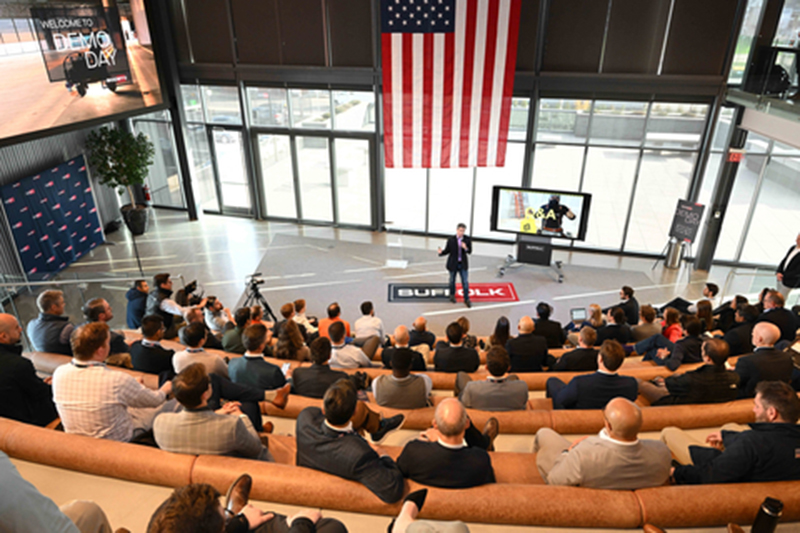
Roxbury, MA Amid labor shortages, materials cost escalation, economic uncertainty and increased sustainability requirements, now is a critical moment for the construction industry to adopt and implement cutting-edge technology. Recognizing the current need for innovation, Suffolk Technologies, the venture investment affiliate of Suffolk, created its Boost program, an intense business accelerator that connects built world technology startups with Suffolk leaders, industry experts and academics. Boost celebrated the culmination of its six-week program at its third annual Demo Day event.
At Demo Day, the seven Boost startups had the opportunity to showcase their companies, products and built world solutions to investors, fellow construction technology founders, customers and technology enthusiasts. The event, hosted by Suffolk Technologies at its headquarters, is designed to inspire founders, increase brand exposure, facilitate industry connections and unlock new resources for the startups as they complete the Boost program. These startups are focused on areas ranging from sustainability to supply chain improvements, all powered by the goal of streamlining the construction process, delivering more efficient buildings and providing maximum benefits for developers, contractors and consumers.
“Suffolk Technologies is tremendously excited by the caliber, drive, creativity and technical excellence exhibited by this year’s Boost cohort,” said Parker Mundt, vice president of platform, Suffolk Technologies. “This year’s Demo Day was a successful demonstration of each startup’s ability to solve industry challenges, rethink the construction process and propel the built environment forward. This event is further proof of the industry’s desire and potential to innovate and gives us a window into the future of the built world.”
Over the last six weeks of Boost programming, the seven startups attended growth workshops, developed partnerships with Suffolk construction solution directors and operational personnel who helped participants fine-tune their products for the jobsite, and discussed industry innovation trends with Suffolk Technologies portfolio company founders.
“What makes the Boost program so unique, and valuable, is how closely cohort participants work with the Suffolk operational team, as well as how quickly Suffolk Technologies allows startups to stress test their product in a jobsite environment,” said Brittany Harris, co-founder and CEO of Boost participant Qualis Flow (QFlow).
“The Suffolk Technologies team has been instrumental in helping us understand what the space looks like, the applicability of our product and ultimately where the market is going in terms of digital transformation,” added Jade Cohen, co-founder and CPO of QFlow. “You don’t get many opportunities like this one to engage with operational teams on this level.”
This year’s Boost program, which was recently voted a Center for Real Estate Technology & Innovation 2021 Accelerator of the year, drew one of the most highly competitive applicant fields to date; the program received 185 applications from 32 countries. Applications for this year’s Boost program focused on sustainability, design, planning, robotics, advanced data analytics and smart building, among others, and the following seven finalists were chosen from the group of applicants to participate in the program.
BuidClub: The late delivery of construction materials to a jobsite can negatively impact project schedules and costs. BuildClub provides contractors an easy-to-use solution allowing them to order sought-after building materials on demand for delivery in as little as one hour which ensures efficiency and productivity on projects.
CalcTree: Critical and complex engineering calculations have historically been derived from offline, fragmented calculation tools. CalcTree brings together engineering teams, designs and calculations onto one cloud-based management platform, where calculations can be easily shared and translated to streamline engineering work.
Carbon Title: The real estate industry is responsible for 38 percent of carbon emissions. Carbon Title provides an end-to-end software platform designed to empower the real estate industry to calculate carbon impact and reach carbon neutrality goals.
Constrafor: Cashflow for trade partners is a major cause of default in construction, and on average trade partners wait for 83 days to be paid for work completed. Constrafor is setting new standards of productivity and cost-efficiency regarding how general contractors and subcontractors procure and cashflow their projects.
PLOT: Jobsite coordination can be chaotic, with many trade partners at work, an ever-changing jobsite, and unstructured communication. PLOT’s Delivery Calendar, Logistics Map and Structured Messenger ensure constant alignment within project teams.
Qualis Flow (Qflow): Tracking materials on a jobsite with paper tickets is overwhelming and can lead to incorrect or missing information. Qflow is a digital platform enabling construction teams to collect and make decisions based on real-time materials and waste data at the source.
TrustLayer: Tracking insurance certificates is critical to mitigate jobsite risk, but compliance is a tedious, uphill battle. TrustLayer offers a collaborative risk management platform helping to reduce friction between stakeholders by automating the verification of insurance, licenses and compliance documents that contractors receive from their business partners.
Startups that have participated in Boost over the past several years have benefited greatly from the program. The Boost I and II cohorts, which included startups such as CANVAS, Moxion Power, Flexbase, Wint, Felux, Soil Connect and Rugged Robotics, have collectively raised more than $300 million of venture funding after participating in the program.
This year, Boost is presented in partnership with Autodesk, Moog Construction, Procore, Liberty Mutual, MIT DesignX and Gunderson Dettmer.
.png)






